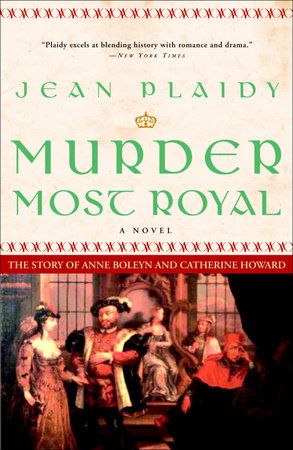Murder Most Royal Reader’s Guide
By Jean Plaidy


1. Henry’s romance with Anne Boleyn is described as the first time he has truly been in love. Why do you think he was so easily led to condemn her?
2. Catherine Howard’s early romances and her flirtation with Culpepper provided ample grounds for Henry to find fault with her. Were it not for these transgressions, do you think Henry could have remained happily married to her, or would he have been able to find other faults? Should Catherine have admitted her affairs before marrying the king? What do you think would have happened if she had?
3. Who is the wisest of Henry’s wives and why?
4. In planning his divorce from Katharine and pursuit of Anne, Henry mused, “The girl was there, and it pleased him to think of her in his arms, for such reflections were but natural and manly; and how she was to be got into that position was of small consequence, being a purely personal matter, whereas this great question of divorce was surely an affair of state.” This separation of state and personal matters, while contrived, does make some effort to mediate the cruelty he is to inflict on his wife by casting the divorce as a purely political matter. How much does this division and decisive (if deluded) reasoning carry through in Henry’s future marriages? Does this way of thinking conflict with Henry’s later identification of himself with England as one and the same?
5. Plaidy writes of Wolsey, “The Cardinal’s true religion was statecraft.” Discuss Wolsey’s adherence to statecraft as opposed to his allegiance to the church of Rome. How does this “religion” work? What can he hope to achieve through it? What is his endgame?
6. Before she agrees to marry him, Anne tells Henry that she must have the
chance to love him as a man as well as a king. She thinks: “Love first, power second. Ah, could I but love this man!” Do you think Anne has real hope that she could grow to love Henry, or is this merely a way of buying time before she is forced to succumb? Do you think she grows to love him? How would you describe their relationship as king and queen?
7. After More’s death, the powers of Europe mourn the execution of a great thinker and leader. The English people mourn a brave martyr. Henry’s reaction is to cast blame on Anne. The author paints More’s execution as the point at which Henry is revealed as a tyrant, a “cold, cruel, implacable, relentless egoist.” Why is this moment so significant?
8. Though Henry is often irrational and irascible, he does have certain predictable impulses and patterns of behavior that are observed and manipulated by his counselors and confidantes. What traits of Henry’s make this type of manipulation possible? What would you consider the most important things for his close counselors to understand about the king if they are to survive their posts?
9. Though Henry’s negative traits grow more menacing through his reign, his powers as statesman also increase as he grows to appreciate his father’s frugalness and shows an awareness of his duty to England as a European power. Do you see any significant signs that Henry is developing as a ruler? What experiences lead him to develop as he does?
10. Discuss the reaction of the “sentimental” and “superstitious” people to the serial dismissal of Henry’s wives. Do their loyalties appear fickle, or do you recognize any constants in their opinions?
11. A theme in the book is the willful delusion of one’s conscience to avoid responsibility. This is the case with Henry throughout his romantic adventures; with the dowager duchess as she allows Catherine Howard to be brought up with little or no discipline or education; with Catherine and Derham as they declare themselves married to enjoy an illicit romance. What drives these characters to behave as they do? Is this mere carelessness, or is there something more at play?
12. Who do you consider to be the heroes of the book? What makes a person heroic or even virtuous in this story?
13. Why does Jane Rochford spy and tattle as she does? In the case of Anne Boleyn, she is driven partly by jealousy and vindictiveness–but why would she continue this dangerous behavior with Catherine and others? At what point do you think Jane goes mad? Is George to blame?
Just for joining you’ll get personalized recommendations on your dashboard daily and features only for members.
Find Out More Join Now Sign In